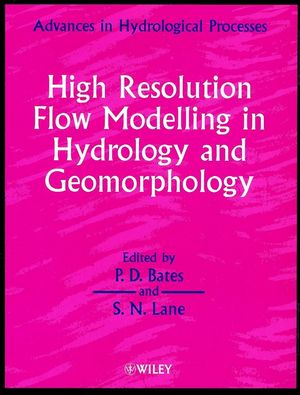High Resolution Flow Modelling in Hydrology and GeomorphologyISBN: 978-0-471-97875-6
Paperback
288 pages
August 2000
 This is a Print-on-Demand title. It will be printed specifically to fill your order. Please allow an additional 15-20 days delivery time. The book is not returnable.
|
||||||
Introduction
THEORETICAL ADVANCES
1. Hydraulic modelling in hydrology and geomorphology: a review of high resolution approaches
2. Modelling wetting and drying effects over complex topography
3. The 2-D transport module SUBIEF: applications to sediment transport and water quality processes
4. Using lagrangian particle saltation observations for bedload sediment transport modelling
HYDRAULIC MODELLING
5. High resolution two-dimensional spatial modelling of flow processes in a multi-thread channel
6. Numerical modelling of separated flow in river bends: model testing and experimental investigation of geometric controls on the extent of flow separation at the concave bank
7. Investigation of controls on secondary circulation in a simple confluence geometry using a three-dimensional model
8. Flood routing based on diffusion wave equation using mixing cell method
9. Investigating two-dimensional, finite element predictions of flood plain inundation using fractal generated topography
10. Integrating remote sensing observations of flood hydrology and hydraulic modelling
HYDROLOGICAL MODELLING
11. An integrated physically-based model for arid region flash flood prediction capable of simulating dynamic transmission loss
12. Modelling the spatial variability in floodplain soil contamination during flood events to improve chemical mass balance estimates.
13. Kinematic wave modelling of vertical movement of snowmelt water through a snowpack
14. Kinematic wave modelling of saturated basal flow in a snowpack
15. The introduction of runoff routing into large-scale hydrological models
GEOMORPHOLOGICAL MODELLING
16. Numerical Modelling of floodplain hydraulics and suspended sediment transport and deposition
17. Modelling with adjustment in straight alluvial channels
18. Morphological modelling of rivers with erodible banks
THEORETICAL ADVANCES
1. Hydraulic modelling in hydrology and geomorphology: a review of high resolution approaches
2. Modelling wetting and drying effects over complex topography
3. The 2-D transport module SUBIEF: applications to sediment transport and water quality processes
4. Using lagrangian particle saltation observations for bedload sediment transport modelling
HYDRAULIC MODELLING
5. High resolution two-dimensional spatial modelling of flow processes in a multi-thread channel
6. Numerical modelling of separated flow in river bends: model testing and experimental investigation of geometric controls on the extent of flow separation at the concave bank
7. Investigation of controls on secondary circulation in a simple confluence geometry using a three-dimensional model
8. Flood routing based on diffusion wave equation using mixing cell method
9. Investigating two-dimensional, finite element predictions of flood plain inundation using fractal generated topography
10. Integrating remote sensing observations of flood hydrology and hydraulic modelling
HYDROLOGICAL MODELLING
11. An integrated physically-based model for arid region flash flood prediction capable of simulating dynamic transmission loss
12. Modelling the spatial variability in floodplain soil contamination during flood events to improve chemical mass balance estimates.
13. Kinematic wave modelling of vertical movement of snowmelt water through a snowpack
14. Kinematic wave modelling of saturated basal flow in a snowpack
15. The introduction of runoff routing into large-scale hydrological models
GEOMORPHOLOGICAL MODELLING
16. Numerical Modelling of floodplain hydraulics and suspended sediment transport and deposition
17. Modelling with adjustment in straight alluvial channels
18. Morphological modelling of rivers with erodible banks



